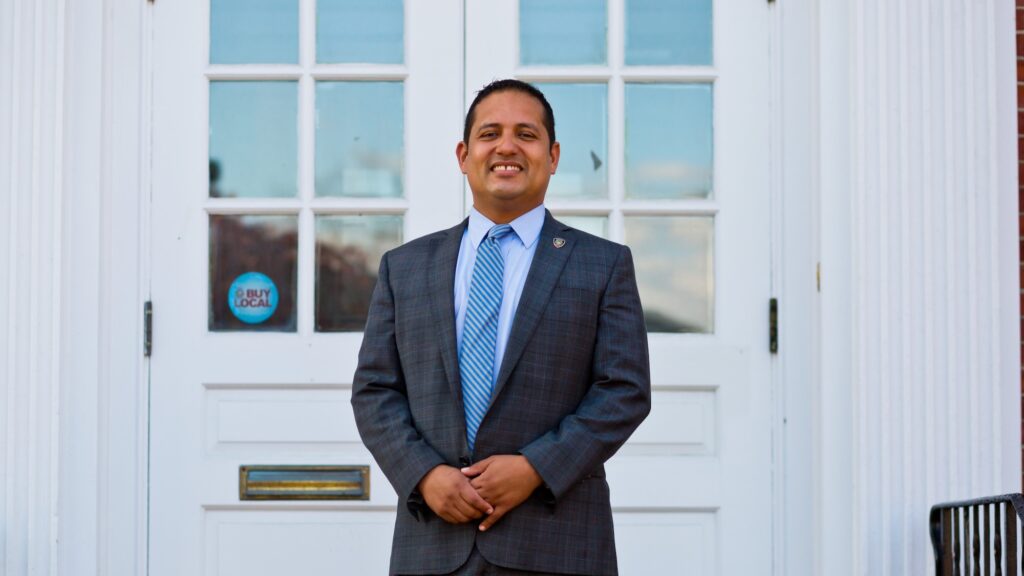Town Meeting Preview Part III

Reading, MA — In preparation for the beginning of Town Meeting this coming Monday, the Reading Post sat down with Town Manager Fidel Maltez to preview the twenty-three articles which make up the warrant for Town Meeting. Parts one and two of this series reviewed articles one through fifteen. This third and final article will preview warrant articles sixteen through twenty-three.
Article sixteen asks the town to appropriate funds for the development of a roadway design for Haven Street improvements. Any construction of the project would be started after the water main project is completed. “We see Haven Street as a huge opportunity for economic development,” Maltez shared. “With additional lighting . . . if we make [Haven Street] look like Main Street, we think it is going to accelerate the potential for growth in that corridor,” Maltez concluded.
Article seventeen proposes additional borrowing for the replacement of the roof at Parker Middle School. Maltez reported that this project went to bid and was pleased to share that the accepted bid is lower than what has already been appropriated; thus, this article is not needed and will be tabled. After discussion, the Select Board will also be tabling article nineteen, which asked the town to authorize the Select Board to acquire the former Walgreens building at 17 Harnden Street for use as a senior center. The Board believes that it is premature for Town Meeting to vote on this article as there are still too many unknowns. The Select Board may call for a special Town Meeting early in the New Year to consider this proposal.
Article eighteen asks Town Meeting to amend the Smart Growth Stabilization Fund to bring it into compliance with Massachusetts General Law and requests that $414,000 be transferred from Free Cash into the fund. These funds were received from the Commonwealth as payment for development in the Downtown Smart Growth District. The funds may be used for any purpose for which the town can lawfully borrow money.
Article twenty was sponsored by the Climate Advisory Committee (CAC) and seeks to create a bylaw limiting the distribution of polystyrene food service containers and utensils by food establishments in town. The CAC hopes that establishments will switch to items made of healthier and more environmentally friendly materials. Alternative products that could be used in place of polystyrene include paper, cardboard, foil pans, compostable materials, and other types of plastics.
At the August 31 Select Board meeting, CAC chair David Zeek presented the proposed article to the Select Board. He shared that polystyrene is indicated by the recycling number six on its packaging and is often used for take-out or leftover “doggie bags” from food establishments. It is also used in some single-use utensils. The proposed ban created by the bylaw would include polystyrene use by restaurants, food vendors, and other organizations which serve food to the public.
Zeek clarified that the proposed bylaw would not include items made out of other types of plastics, nor would it include the sale of polystyrene products purchased in bulk for personal use at retail establishments. It would also not apply to situations where food is delivered to a store or restaurant prepackaged using the material.

Zeek continued, sharing that polystyrene is the only plastic used in food packaging that is considered to be carcinogenic. He also shared that the carcinogenic material in polystyrene has been shown to leak into food. Zeek argued that polystyrene is a health hazard for wildlife as it can take over 200 years to break down in the environment and is seldom recycled. Zeek concluded, indicating that forty-seven other communities in the Commonwealth have enacted a similar bylaw.
Concerns have been expressed about this article stating that there needs to be more outreach to businesses to indicate impacts the proposed bylaw may have on them. There is also concern regarding the price of and available supply lines for alternative products.
Article twenty-one asks the town to accept a gift of $10,000 to the town from John Parsons to establish the Laura S. Parsons Trust. The funds in this trust are for use by the Council on Aging for programming and other matters.
Article twenty-two asks the town to adopt a mandatory charge per kilowatt hour to be sent to the Massachusetts Renewable Energy Trust Fund. This is part of the legislation signed by Governor Charlie Baker allowing Reading and other communities with municipal light companies to join the Green Communities initiative. Maltez shared that the charge would work out to $4.92 annually for the average Reading electrical customer. As the law was only signed by the governor in early October and has yet to be in effect, this article will be tabled and likely be considered at the April 2023 Town Meeting.
Approval of article twenty-three would require owners of commercial buildings or residences with greater than three or more units in the Downtown Walking District to shovel the public sidewalks in front of their buildings down to the hard pavement for the entire width of the sidewalk by 9:00am after a snowstorm. This article was submitted by citizen petition. According to the town bylaws, any ten citizens may request an article be placed on the warrant for any Town Meeting.
Maltez shared that he is excited for his second town meeting. “We have heard Town Meeting in April and are trying to move on items raised by residents as quickly as we can.” Maltez declared.
Town Meeting will begin at 7:30pm on Monday, November 14, and is expected to last three or four nights. The Reading Post will provide complete coverage of Town Meeting. RCTV will also be airing Town Meeting live on channels 22 on Comcast and 33 on Verizon and live streaming it on YouTube.
